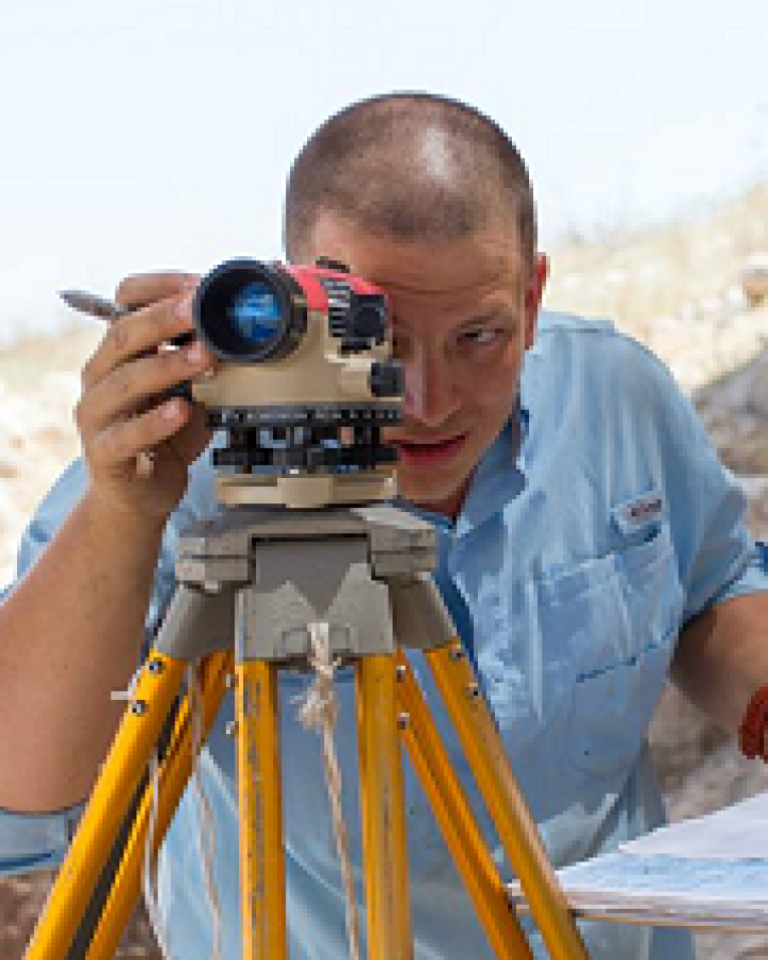Eric Welch

Mentor Spotlight | Winter 2015
Department: Jewish Studies Program
Describe your work in a few sentences that we can all understand: I study the historical, social, and cultural backgrounds of the Hebrew Bible (Old Testament). A significant part of my job is conducting archaeological excavations at sites mentioned in the Bible to learn more about their history and the lives of the people that once inhabited them.
Q: How did you first get interested in doing research/creative work?
A: Archaeology was always fascinating to me, but it wasn’t until I took a class at Harvard and met “real” archaeologists that I considered it something I could actually do. Having the opportunity to see ongoing research in the basement of Harvard’s Semitic Museum changed everything for me. It was there that I first saw graduate students and faculty working on all sorts of materials spread out across tables. Getting the chance to look over someone’s shoulder while they explained what they were looking for made me realize that this was something I wanted to do.
Q: What do students in your discipline learn by doing research that they wouldn’t learn by just taking classes?
A: In archaeological research students learn how to collect, record, and manage data in a hands-on environment. Every piece of pottery that comes out of the ground is kept, tagged, and processed according to very specific guidelines. Over a four week season this becomes a significant amount of information that must be synthesized and reported on in a clear fashion. Additionally, students are researching as a part of a large international team with many different specialists. Students gain practical experience in working in this international environment and learning how to cooperate on an interdisciplinary project. The best part is that all of these skills transfer far beyond archaeology. I always tell my students that I don’t care if they plan to go work on Wall Street or have a career in nursing; the ability to record data, synthesize it, and report on it to a larger team is critical to success wherever they will go.
Q: What do you find to be the most exciting part of doing research/creative work? What makes this line of work meaningful and interesting to you?
A: So many parts of archaeology are exciting. First is the reality that I get to be the first person to touch an artifact or stand in a room in 3,000 years. It’s probably the closest you can come to time travel, and it really brings home the fact that these were real people, not just imaginary figures. The other part that’s exciting is that every summer I’m recovering new information that sheds light on our understanding of the historical world of the Bible. This is a book that has been studied and discussed for 2,000 years, and I’m privileged enough to be a part of the team that is introducing brand new data to the conversation.
Q: What advice do you have for undergraduates interested in doing research in your field?
A: Start a conversation. Archaeology sounds like this impossible thing to get started in, but when you have someone guiding you, you realize that it’s actually something really easy to get started in. When I started excavating I didn’t have any experience. Now, a decade later, I’m running large portions of our project. I wouldn’t be where I am without having that first conversation with my TA at Harvard. That opened the door and made me realize that this was something I could actually try.
Q: For many students, doing research is the first time they have done work that routinely involves failure and the need to troubleshoot problems. Can you tell us about a time that your research didn’t go as expected? Have you developed any tricks or habits that help you to stay resilient in the face of obstacles?
A: Archaeology is a good analogy for research because it’s the kind of pursuit where you’re trying to make progress without actually knowing where you’re going. It’s easy to imagine that under the ground you have amazing finds, but sometimes there’s nothing there. I always tell my students, “We can only dig what the dirt allows us.” Not getting the desired answer is a part of the process, but that doesn’t change your obligation to record, analyze, and report on your findings or lack of findings. Sometimes being able to explain why you don’t have an answer yet is just as powerful as having the answer. Always asking yourself, “What evidence would I need to answer this question?” can help reframe the problem and redirect your research’s approach.
Q: How do you spend your time outside of work?
A: I like to get out to Clinton Lake once or twice a week just to be outside—it’s a great place to think. Otherwise nearly all of my free time is spent with my wife and two kids. We like to work out in the yard and water the flowers together. Yard work makes the kids think they’re “digging like Daddy.” If only they knew how many times archaeology felt like doing yard work…